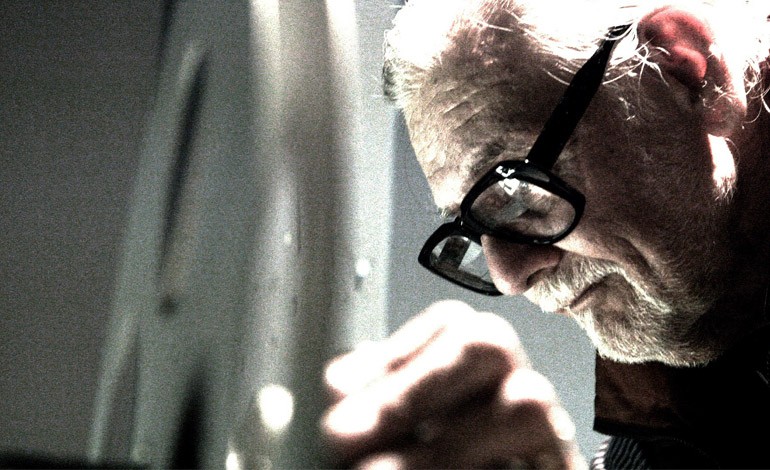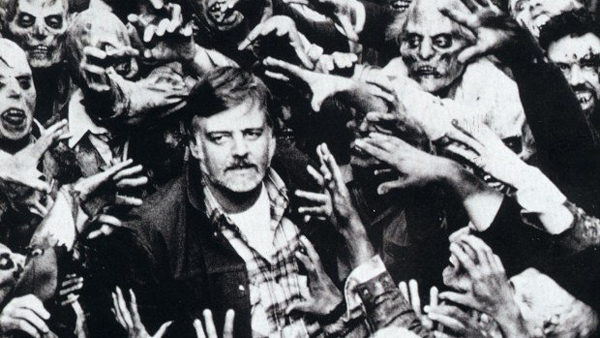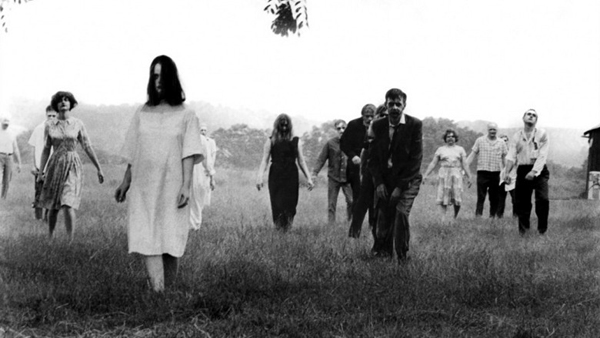REELSIDE: Philip Riccio on George A Romero
REELSIDE Episode 102: George A Romero
REELSIDE is a six-part documentary series that explores the creative process with Canadian filmmakers and actors. Follow them as they tell their stories every Thursday on TMN.
I have to admit, I was a little nervous about interviewing Philip Riccio, the filmmaker who collaborated with George A Romero on the upcoming REELSIDE episode. Why? Because I don’t do zombies, or know anything about them. Despite not knowing anything, even I knew that George A Romeo is pretty much the founding father of the zombie genre. I was crossing my fingers that it wouldn’t be too obvious most of my Romero knowledge was culled from Wikipedia but it turned out I didn’t have anything to worry about. Philip, I was initially surprised to find out, isn’t a fan of the zombie genre, or even a diehard Romero film fan at that.
“I didn’t know any of his work when I first worked with him as an actor [Philip acted in Romero’s Diary of the Dead],” he explains. “I just met him as kind of a guy and as a guy he’s this really nice, knowledgeable filmmaker. That’s how I connected with him.” Philip goes on to say that’s what he was trying to capture in their episode–a side of Romero that might not be out there already. Think less Father of the Zombie Genre and more Talented Filmmaker.
And I think it was totally successful. I’m not exactly sure what I was expecting a zombie-genre filmmaker to be like (Maybe more sullen? Hungry for brains? Eh?), but Romero was not it. He came across as this chill, totally sweet, incredibly interesting guy.
Philip isn’t a zombie geek because he’s a theatre geek–he runs an independent theatre company in Toronto, Company Theatre (and I’m an Ikea Monkey geek, not that you care). He’d stayed in touch with Romero after filming Diary of the Dead and knew the producers behind REELSIDE. Considering Romeo one of his mentors, it only made sense that they would end up collaborating on an episode together.
The episode is technically a film about making a film. Philip wants to make a film on actual film (for all of you born in the 90s, go Google it and have your minds blown) and we get to see him and Romero go through the process, step by step. From the first ideas to cutting (literally cutting) in the editing room, to the final piece showing at the very end.
What I’ve been most fascinated about REELSIDE so far is how deeply personal and unique each episode has been. Philip confirmed that he was given complete freedom to shape the story as he wanted and said it all unfolded very naturally, with decision to recreate one of Romero’s first films actually being decided after the episode as being shot. So, so cool.
And let me say now that this isn’t really about zombies (sorry, zombie fans). I mean, sure, zombies are mentioned because it will always be part of Romero’s life, but what this is is way better. This is an exploration of filmmaking tools and creative processes and how they shape a filmmaker’s career. It’s heavy on the nostalgia and completely honest about the old tools of the trade because, honestly, making a film on film seems effing hard.
GEEKPR0N: I want to talk a little bit about the opening line of this episode, which is dramatic, to say the least, and I completely agree with it: “Film isn’t dying, it’s dead.” Can you defend that statement? What makes you feel that way?
Philip Riccio: That was kind of my personal experience when I went to make my first film in about 2010. Film was still around and when I would talk about it with people there was still kind of that “will you make it on film or go digital?” thing. When I got into the process of what the actual choices were to make it, film was not on the table. It was over, and that was five years ago now. And then I made my second film in 2013 film wasn’t even talked about. I think there are big filmmakers who are using film still, who are still really fighting for it. I think on a practical level, if you’re a young filmmaker wanting to make a film, no one is doing that on actual film anymore. And to process film is almost impossible now. I think we found the last lab in Toronto that actually processes real film.
GP: Yeah, it doesn’t seem very economical. And one of the great things about all the digital equipment and everything being online is that you can make a film and have an audience and be accessible and build yourself up but if you’re trying to do it with film all of your money might be going into attempting just to get the film out of the camera and onto something where you can edit.
PR: That was the funny thing. Just the process of making a film on film is not economically viable anymore. I was talking to George about when he used to make films and it used to be that just the film stock alone was so expensive. When I went to make my first film I had so many offers for free film stock because there was so much of it not being used. In the end we wouldn’t have been able to afford to process it anyway so it was kind of useless.
But working with George on this, you realize how it used to be such a kind of tactile craft and now it’s more of a visual, mental thing. You’re not actually working with your hands whereas I think with the early filmmakers, everything was with their hands. Almost like a carpenter or a welder—actually building something with your hands.
GP: Yeah, he knew how long a scene was by literally holding up a film piece—like, that’s incredible. And there’s nothing tangible to look at anymore. “I have 45GB on this hard drive. That’s so many hours of footage.” But it’s like, does it really exist? It’s all data. [laughs]
PR: I know, fascinating, so fascinating to me. And the experience of editing now is so different. Just even be able to cut a frame is so easy for us now.
GP: I think in editing programs it’s still called “slice tool.” And now I have in my head that you could be there with an X-acto knife shaving off little ends of a frame so you could get it exactly right. And if you cut off too much do you tape it back on, what do you do?!
PR: I know, imagine that! And the cost of fucking that up would be extraordinary. And that’s the editing part. Then there’s the filming part, which is insane to me too. When George was making films, they would have no idea what they captured. Now, you know, you’re on set and you just take the playback for granted.
GP: Well one of my other questions was would you actually want to make a film on film now and I feel like the answer might be a “no…”
PR: I don’t think I could do it! I mean, I just couldn’t do it. It would be. Going in I thought for sure after having this experience the answer to that question would have been “yes” and I would have been all nostalgic for it. I thought even George would be way more nostalgic for it. Filming this short and the editing process was so painful. So, so, slow. It boggles my mind, it honestly boggles my mind. I love film and I do want to be a filmmaker but I don’t know if I would’ve done it back then. That’s the other thing, that you just respect people like George so much. Because he was doing this with a bunch of friends and they were just making an indie like we do now but look at the amount of work that went into it.
GP: I was reading up about George Romero on Wikipedia and I found a tid-bit and I hope it’s true, but Quentin Tarantino once said that the “A” in George A Romero stands for “A Fucking Genius.” Do you agree with that statement?
PR: Do I think he’s a genius? That’s a hard question. To me he is. Other people would be able to speak to his work more than me but he’s been one of my greatest mentors for sure. When we met, I realized immediately I was collaborating with someone who was an artist. Even though we were making kind of a low budget zombie film, the experience was as if we were making art. And that was really inspiring. I think he is a genius in that way, at least. More, I think he’s an artist. I think he puts himself in all the work that he does and I think that’s what resonates with people more than anything. That’s what sets his movies apart.
GP: Quickly, if you could do another REELSIDE episode, who would you wanna do it with?
PR: Oh wow, that’s not quick, that’s huge…[pause] You know who I’d love to do actually, Sarah Polley. I love her and I love her work.
GP: Stories We Tell is up there as one of my top 15 favourite films.
PR: I agree, I agree. I love that movie.
GP: She was in a zombie movie, wasn’t she!
PR: She did the remake. [2004’s Dawn of the Dead]
GP: You guys have a connection!
PR: We kind of do except for George didn’t make that movie and he hates it. [GP Note: It was directed by, ugh, Zack with-a-K Snyder.]
GP: Oh, okay. Well then, never mind! Are you looking forward to any other REELSIDE episode in particular?
PR: Oh, I can’t wait to watch all of them. I’m kind of like any other audience member and I’m just watching them as they air. I think the Don McKellar one looks pretty hilarious.
GP: Since this is a Canadian show and we love Canada, what’s your favourite Canadian film, director, actor, actress—I guess we already talked about Sarah Polley–but any other Canadian-ness you want to toss out there for people to get excited about?
PR: Yeah, of course, I love shouting out to Canadians. There’s just so many that I love… Actor-wise, two of my very favourite actors are Nicholas Campbell and Eric Peterson. I just got to work with Molly Parker, who is amazing. Film-wise, Grown Up Movie Star is a great movie. I love Tatiana’s [Maslany] performance.
GP: Oh! I’m so glad you mentioned that. I don’t know anyone who knows that movie. She is just so outstanding in it. [Note: Seriously, people, see that movie.]
PR: She was in Diary of the Dead with me and George.
GP: Ohhhhh really? Maybe I’ll have to go and watch a zombie movie now. Okay, lastly, I feel like you can really judge a person based on their answer to this: who is your favourite, or who do you feel is the superior Batman.
PR: Oh, interesting. That’s tough… I have to go Bale, I have to. I love the Dark Knight movies. I do love Michael Keaton but I think I’m more into Michael Keaton in Birdman than Batman.
GP: I usually bounce between those two as well so I say you pass.
PR: What do you expect from Affleck? Were you one of those “Oh, god no” people?
GP: I try not to do that. Especially because sometimes people are cast and everyone is all, “That person could never do it!” and then turn out to be great. But I didn’t really like Man of Steel that much.
PR: I agree.
GP: I haven’t enjoyed the trailers for this one [Batman vs Superman] either. Also, I don’t know why they’re fighting. Why can’t they just be friends?
PR: [laughs] It guess it wouldn’t be much a movie. Although it could be good–them just hanging out, having a good time.
I guess it would be weird if I ended this on Batman. Instead, how about my favourite part of the episode? It’ll be your favourite part too, because obviously. Philip and Romeo are talking about working together and how “everyone has their own zombie walk.” I tell Philip that I feel like it’s something you tell young people when they’re graduating from high school or something, all: “Son, everyone has their own zombie walk.” Deep down, you’ve got to become the zombie. Philip agrees.
“You do, and the crazy thing is, it kinda works. You do just kinda have to find your own zombie walk.” I muse that I’ll have to give some thought to my walk and he firmly disagrees.
“I think actually it’s the opposite: you can’t think about it. It’s almost like dancing. You have to just do it. It can’t be intellectual, it has to be completely organic and physical. And your body will start doing shit you didn’t know it could do.”
And there you have it. Find your zombie walk, kids.
——
Philip Riccio and George A Romero’s episode of REELSIDE airs this Thursday at 9:00 PM on TMN. Don’t be a goober and miss it now, ya hear? (For all you in Western Canada, REELSIDE will be coming to you soon!) And we’ll have more interviews with REELSIDE directors coming up because we know you guys want them.
REELSIDE website + Twitter + Facebook










